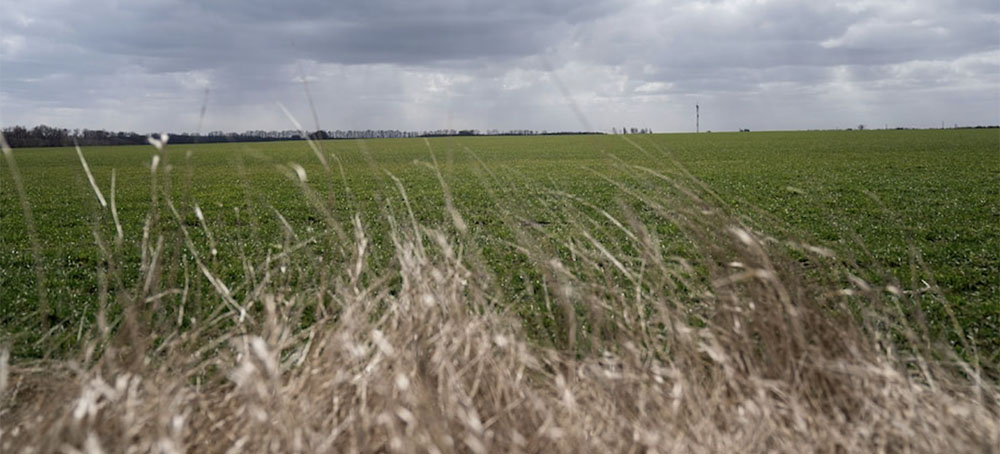UN: Nearly 25 Million Tons of Grain Are Stuck in Ukraine
Tristan Bove Fortune A field of young wheat seen in late March in Uman, Ukraine. (photo: Michael Robinson Chavez/WP)
08 May 22
A field of young wheat seen in late March in Uman, Ukraine. (photo: Michael Robinson Chavez/WP)
08 May 22
In spite of Russian troops blockading Ukraine’s ports, the country’s harvest has continued, but most crops have been unable to leave Ukraine. Now, millions of tons of grain are sitting idle, and the country’s storage capacity is reaching its limits while the world gets hungrier, according to the UN’s top food agency.
Nearly 25 million tons of grain are currently stuck in Ukraine and unable to leave the country due to obstructed seaports and infrastructural issues, said Josef Schmidhuber, an economist with the Food and Agriculture Organization.
Speaking at a press briefing on Friday, he warned of an “almost grotesque situation” in Ukraine, in which grain is being harvested according to regular schedules, but cannot be taken out of the country.
"[There are] nearly 25 million tonnes of grain that could be exported but that cannot leave the country simply because of lack of infrastructure, the blockade of the ports,” Schmidhuber said.
He clarified that the war has so far not had a significant impact on harvests, but it is becoming harder and harder for global markets to access Ukraine’s food commodities.
Schmidhuber explained that most of Ukraine’s winter crops were planted and harvested in the west of the country, far away from the brunt of the fighting and the war did not impact the recent harvest. He added that around half of the planned summer crops are already in the ground, although it is uncertain how much of it will be reaped.
“A considerable crop could be coming in going forward,” Schmidhuber said, but added that the outlook for grains leaving Ukraine remained uncertain, especially if Black Sea ports remained blocked by Russian forces.
Ukrainian ships have been blocked from leaving Black Sea ports for months, and the director of the UN World Food Programme in Germany announced earlier this week that almost 4.5 million tons of grain are currently sitting in containers in Ukrainian ports, unable to leave because of unsafe or occupied sea routes.
Grain shipments from Ukraine are usually done by sea, according to Schmidhuber, but are now being taken out of the country by rail more and more frequently, something he said can be exceedingly more complicated. Grains leaving Ukraine by train can sometimes need to be unloaded and placed on new carriages due to different railway specifications, such as different widths between rails on a single track.
Ukraine and Russia combined are some of the world’s largest suppliers of key agricultural commodities, including wheat, rapeseed, maize, and sunflower oil, according to the FAO. The disruption of these crucial global supply chains has raised food prices and exacerbated hunger issues in some of the world’s most vulnerable regions.
There are also some reports that Russian troops have been looting Ukrainian grain storages, according to the FAO.
“There is anecdotal evidence that Russian troops have destroyed storage capacity and are looting storage grain that is available,” Schmidhuber said, adding that there are also signs Russian troops have been stealing farm equipment as well, potentially putting the productivity of future harvests at risk.
“Grain is being stolen by Russia and transported by trucks into Russia,” he said.
The uncertainty about what direction the war will take, Ukraine’s limited storage capacity for grain, and evidence that Russian troops have been stealing and damaging harvests and farming equipment, means that global food prices—especially those for cereals and meats, according to the FAO’s latest monthly food price index—are still highly volatile.
In its latest food price index, released on Friday, the FAO announced that global food prices decreased in April after a huge jump last month, but Schmidhuber stressed that it was only a small decline.
The UN said in April that 45 million people worldwide suffer from malnourishment, with up to 20 million more at risk of famine because of the war. Highly vulnerable regions of the world where the war is expected to amplify hunger include countries in the Sahel and West Africa, according to the World Bank.



